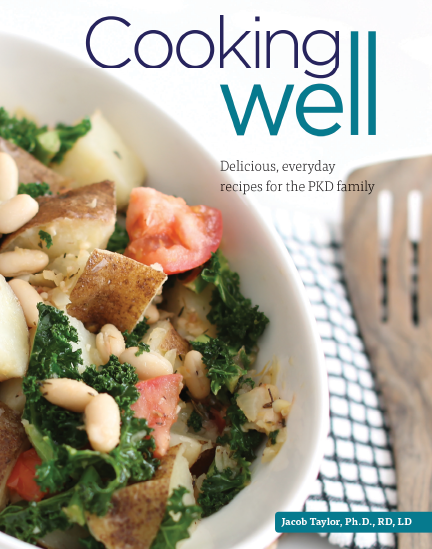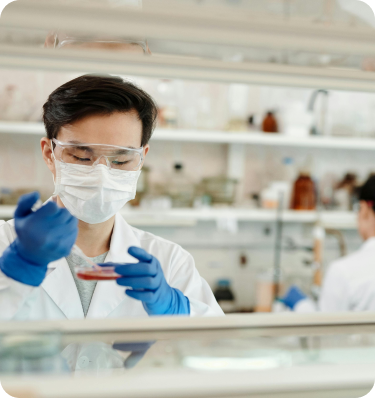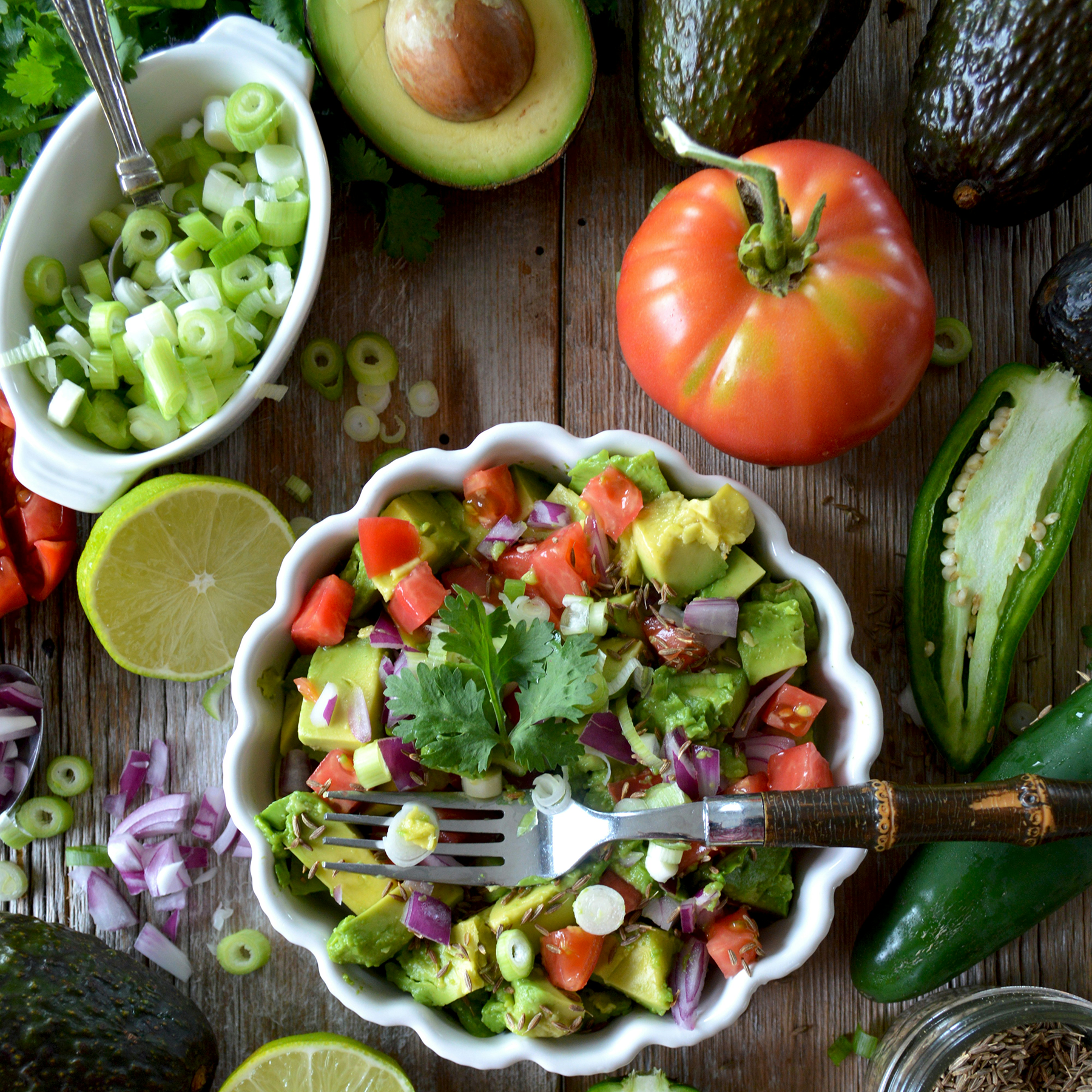Studies in high blood pressure patients without PKD have shown that the so-called DASH diet (Dietary Approach to Stopping Hypertension), which consists of lots of fruits and vegetables combined with low-fat dairy, may lower blood pressure. A diet based on these guidelines could also seem appropriate for you. Talk to your doctor before significantly altering your diet.
- Breakfast: One serving of egg substitute, scrambled with fresh chopped onion and red and green bell peppers. Pair with one slice of white toast with one or two teaspoons of cream cheese and a small bowl (about a ½ cup) of fresh strawberries.
- Snack: One medium apple.
- Lunch: Cabbage rolls-use two or three large, crisp, cabbage leaves to roll up shredded baked chicken, chopped apple, onions, a little bit of mayonnaise, and a sprinkle of honey mustard vinaigrette (made by whisking together apple cider vinegar, yellow mustard, and honey). Serve with a serving of unsalted pretzels.
- Snack: One serving of baby carrots, with homemade, low sodium hummus or ranch dressing.
- Dinner: Low sodium turkey and vegetable chili, topped with a small dollop of low fat sour cream. Serve with five unsalted crackers.
- Dessert: Small slice of angel food cake with fresh strawberries and low fat, non-dairy whipped cream.
- Breakfast: One English muffin with one teaspoon of cream cheese and one teaspoon of sugar free fruit preserve. Side with ½ cup of yellow grits and a small bowl of mixed berries.
- Snack: One small bunch of grapes.
- Lunch: ½ cup cauliflower and ¼ cup chopped red bell pepper, sautéed in 1 tbsp olive oil with garlic and chopped onion. Toss with ½ cup of cooked noodles. Sprinkle with grated parmesan cheese.
- Snack: ½ cup peach slices with ¼ cup cottage cheese.
- Dinner: Two chicken tacos, topped with a small amount of natural shredded cheese, chopped onions, and shredded cabbage. Serve with ½ cup of rice, seasoned with cilantro and lime juice.
- Dessert: One medium apple, sliced and baked with cinnamon.
- Latest Research on Nutrition Metabolism and Diet in ADPKD
- Managing nutrition as dietary needs change from pre-dialysis to post transplant
- Nutritional Considerations for PKD Patients
- For the latest information on diet and nutrition, visit our Resource Library and subscribe to PKD Life.

-
Should I stop eating protein?
The major source of these waste products is the food you eat, especially protein. Therefore, when you have lost a significant amount of kidney function, a lower protein diet may be ordered by your doctor. Studies from both animals and humans with chronic kidney failure have shown that eating large amounts of protein may accelerate the progressive decline of kidney function. However, the Modification in Diet in Renal Disease (MDRD) study done by the National Institutes of Health (NIH) looked at protein intake and kidney function. The results did not show any benefit of lowering protein intake in individuals with PKD. At this time, there’s no convincing evidence to suggest protein restriction as beneficial unless you are in kidney failure. Despite all this, many consider it unwise to consume a very high protein diet. If you have moderate to advanced kidney failure, however, a modest restriction may be appropriate. For more information, you should consult your doctor and a dietitian experienced with kidney disease (and ideally knowledge of PKD), also known as a renal dietician. Recommended: 0.8 g/Kg of body weight. (56 grams/day for a 150 LBs patient). May eat more if you’re vegetarian.
-
Should I stop eating salt?
High blood pressure in PKD doesn’t seem to be caused by salt intake. Regardless, excessive amounts of salt should be avoided and lowering dietary salt may help in blood pressure control. This becomes important when people are on certain types of blood pressure medicine and when they have kidney failure.
Helpful tips to manage salt in your diet:
- Don’t add salt to your food when cooking or eating.
- Try cooking with fresh herbs, lemon juice, ginger, garlic, or other salt-free spices (pepper, cinnamon, cumin) and herbs (cilantro, dill, etc).
- Choose fresh or frozen vegetables instead of canned vegetables. If you do use canned vegetables, drain and rinse them to remove extra salt before cooking or eating them.
- Avoid processed meats like ham, bacon, sausage, and deli meats.
- Munch on fresh fruits and vegetables rather than crackers or other salty snacks.
- Avoid canned soups and frozen dinners that are high in sodium.
- Avoid pickled foods (olives and pickles).
- Be careful with salt substitutes and “reduced sodium” foods. Many salt substitutes are high in potassium.
- Limit high-sodium condiments like soy sauce, BBQ sauce and ketchup.
-
How much fluid should I drink each day?
A chemical called cyclic AMP (cAMP) has been shown to promote growth of polycystic kidneys. In your kidney, cAMP is produced in response to a hormone, vasopressin, which is produced by the brain in response to not having enough water. Avoiding dehydration is considered wise. In addition, generous water intake has the potential to suppress vasopressin production and decrease cAMP production in the kidney. Though there is no good data regarding this in humans with PKD, if kidney function is not impaired, water intake is typically safe. Therefore it seems reasonable to suggest intake of water with a goal of 2-3 quarts of urine output daily. Your urine should generally be pale in color. This will tend to suppress vasopressin production by the brain and cAMP production in the kidneys. In addition, it’s generally suggested that PKD patients limit caffeine intake, since caffeine slows degradation of cAMP. Generous water intake helps maintain a dilute urine and decreases the risk of kidney stones, which are seen at increased frequency in PKD patients. It’s important to understand that the benefit or risk of high water intake has never been formally studied in PKD patients, and the results cannot be predicted or guaranteed. In addition, as kidney function deteriorates, generous water intake can be problematic and even dangerous. It’s important to discuss appropriate water intake with your doctor.
-
Will caffeine damage my kidneys?
There is no direct evidence that caffeine will damage your polycystic kidneys. However, studies of PKD cells grown in a lab have shown that caffeine-like substances promoted cyst growth in PKD. At this time, it may be wise to limit caffeine intake to less than 200 to 250 mg (i.e. two to three cups of coffee) a day.
-
What about potassium?
Potassium is essential to all living cells and is important for muscle and nerve functions in the body. It’s found in most foods including legumes, whole grains, fruits, green vegetables, potatoes, meats, milk, and yogurt. Although potassium is vital to the body, it’s unwise to take potassium supplements in pill or liquid form without consulting your doctor and/or your renal dietician, especially if your kidney function is reduced.
-
What about calcium and magnesium?
In non-PKD settings, a deficiency of calcium and magnesium has been associated with high blood pressure. Dietary calcium and magnesium are best provided by dairy products and are important in maintaining a normal mineral balance as part of a healthy diet. Phosphorus is a mineral found in the body. Calcium and phosphorus are needed to help build strong, healthy bones and keep other parts of your body healthy.
Phosphorus is needed to:
- form strong bones and teeth
- maintain a normal pH balance
- get oxygen to tissues
- create energy by changing protein, fat, and carbohydrate into energy
- develop connective tissues and organs
- move muscles
- produce hormones
- use B vitamins
Daily phosphorus needs:
- Healthy individuals need 800-1,200 mg /day (a balanced, nutritious diet provides plenty of phosphorus)
- When kidney function declines, it becomes difficult for the body to balance phosphorus. Kidney disease patients may need to adjust phosphorus intake to 800 mg/day as function declines. Your nephrologist will watch phosphorus levels in your labs and will advise you how to manage phosphorus.
- It may become necessary to take phosphorus binders to manage phosphorus levels.
-
Should I take extra vitamins?
If you’re maintaining a balanced and healthy diet, you typically won’t need extra vitamins. Unlike food, vitamins are needed only in tiny amounts. Excess amounts of vitamin A, D, and E can accumulate in your body and cause medical problems. Generally, if you feel you need extra vitamins, a one-a-day, generic brand of vitamin is sufficient. Consult your doctor before taking extra vitamins of any kind. Because there’s an increased incidence of calcium kidney stones in individuals with PKD, women with PKD should discuss with their doctor the proper amount of calcium needed. Limiting calcium in the diet won’t prevent kidney stones in non-PKD patients and the beneficial effects of dairy product intake on skeletal and cardiovascular systems are well established.
-
Can I drink alcohol?
Light and/or occasional use of alcohol hasn’t been shown to damage the kidneys or the liver. However, drinking three or more ounces of alcohol a day for many years has been associated with increases in blood pressure and can damage the liver.
-
Can I use tobacco?
Smoking increases the risk of heart disease and stroke and when paired with hypertension, the risks are even greater. Smoking also increases the risk of cancer.





